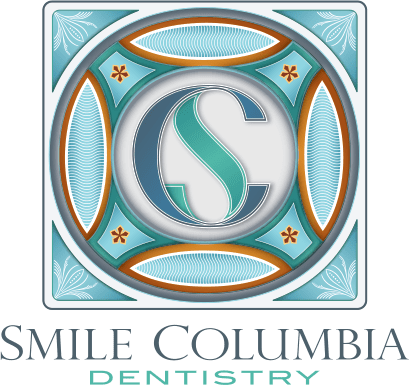If you’ve started treatment for Temporomandibular Joint Disorder (TMD) with Columbia TMJ dentist, Dr. Adam Hahn, there are additional steps you can take at home to enhance the effectiveness of your care. At Smile Columbia Dentistry, we prioritize comprehensive patient evaluations and customized treatment plans to alleviate painful symptoms of TMD.
For patients unfamiliar with the terminology, “TMJ” refers to the temporomandibular joint itself, while “TMD” refers to the disorder affecting this critical joint. Both terms are used interchangeably in discussions about jaw dysfunction and related symptoms.
Understanding TMD Symptoms
If you’re unsure whether you have TMD, watch for these common symptoms:
- Jaw Pain: Persistent or occasional discomfort in the jaw area.
- Clicking or Popping: Noises in the jaw joint during movement.
- Headaches and Facial Pain: Frequent tension headaches or pain in the cheeks and temples.
- Ear Issues: Ringing (tinnitus), fullness, or earaches unrelated to infection.
- Neck and Back Pain: Stiffness or aching that extends beyond the jaw.
- Numbness or Tingling: Sensations in the hands and fingers, often tied to nerve involvement.
If you’re experiencing any of these symptoms, schedule a consultation with Dr. Hahn for a comprehensive evaluation and advanced diagnostic imaging.
TMD Treatment Options
At Smile Columbia Dentistry, we employ a variety of treatments tailored to each patient’s unique needs:
- Oral Orthotics: Custom appliances like night guards or splints, as well as mouthguards or occlusal guards, are effective non-invasive treatments that help realign the jaw and reduce stress.
- TENS Therapy: Transcutaneous Electric Nerve Stimulation to relax jaw muscles and alleviate discomfort.
- Bite Reconstruction: Restorative or cosmetic dentistry to correct alignment issues.
- Behavior Modifications: Adjustments to sleep position, diet, exercise, and posture.
- Minimally Invasive Interventions: Surgery is rarely recommended, as non-surgical approaches often yield excellent results.
While these treatments address the root causes of TMD, at-home strategies can supplement professional care and further alleviate symptoms.
Home Remedies to Ease TMD Symptoms
In conjunction with your in-office treatment, these simple at-home practices can help manage and reduce TMD symptoms:
#1 Daily Habits for Jaw Health
- Monitor Jaw Position: Keep your jaw relaxed while watching TV, working, or reading. Avoid clenching or grinding your teeth.
- Practice Good Posture: Sit and stand in positions that support your spine and jaw alignment.
- Avoid Overworking Your Jaw:
- Refrain from chewing hard or crunchy foods.
- Take smaller bites to reduce stress on the TMJ.
- Never use your teeth as tools to open objects or chew on pens or other inanimate items.
#2 Stress-Relieving Activities
Stress often exacerbates TMD symptoms. Incorporate calming activities into your routine, such as:
- Meditation: Focused breathing exercises to relax your body and mind.
- Light Exercise: Walking or yoga to reduce tension and improve circulation.
- Reading or Hobbies: Engaging in enjoyable activities to distract from pain and stress.
#3 Hot and Cold Therapy
Alternating heat and cold therapy can offer significant TMJ relief.
- Start by applying a warm, damp washcloth or heating pad to the affected area for 20 minutes to increase blood circulation and relax the muscles. Reheat as needed.
- Then, use a cold pack wrapped in a towel for 10-15 minutes every two hours to reduce inflammation and numb pain. Repeat this cycle several times a day for the best results.
#4 Jaw Exercises and Massage
To relieve TMJ discomfort, gently massage your cheekbones in a circular motion using your fingers or a warm washcloth. Incorporate jaw exercises to improve mobility and reduce tension:
- Tongue Push: Press your tongue against the roof of your mouth, then push your top teeth forward while slowly opening your mouth. Repeat up to 10 times.
- Jaw Opening: Apply even pressure to both sides of your jaw and slowly open your mouth without letting it click. If it clicks, release and start over.
For personalized care, Dr. Hahn’s team can recommend specific stretches and exercises, along with gentle massage of the jaw, temples, and neck to alleviate tightness and improve circulation.
Comprehensive TMD Treatment in Columbia, SC
Dr. Adam Hahn is an expert in advanced diagnostics and treatment for TMD. By combining state-of-the-art technology with patient-focused care, we help alleviate symptoms and restore function for a better quality of life.
Why Choose Smile Columbia Dentistry?
- Expertise in neuromuscular dentistry to address the root causes of TMD.
- A range of treatment options, from non-invasive therapies to restorative solutions.
- A dedicated team committed to your comfort and long-term wellness.
Schedule Your TMD Evaluation Today
If you’re experiencing TMD symptoms or want to learn more about managing the condition, take the first step toward relief and improved jaw health. Call Dr. Adam Hahn at Smile Columbia Dentistry today at (803) 781-9090 to schedule a comprehensive evaluation.





